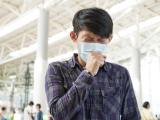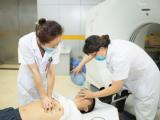Apr 29, 2003 (CIDRAP News) – With the SARS (severe acute respiratory syndrome) outbreak in Toronto cooling off, the World Health Organization (WHO) announced today that it will lift its advisory against travel to the city, effective tomorrow.
WHO Director-General Dr Gro Harlem Brundtland, in announcing the decision, said the number of probable SARS cases in the city has dropped and no transmission in the community has occurred in the last 20 days. In addition, no more cases have been "exported" from Toronto to other countries.
"WHO has also been assured by Canadian authorities that pro-active screening measures at airports will be implemented, as recommended by WHO," the statement said.
Toronto is still classified as an "affected area" with regard to SARS, officials said. Advisories against nonessential travel remain in effect for Beijing, Hong Kong, and the Chinese provinces of Guangdong and Shanxi.
The travel advisory for Toronto was announced Apr 23, prompting protests from Canadian officials. The WHO originally said the advisory would be reviewed after 3 weeks. The decision to lift the warning came after Brundtland met with senior Canadian officials, who stressed that no new cases have been reported outside hospitals in 20 days, or about twice the incubation period, the Associated Press reported.
In other developments, the WHO reported 226 new SARS cases and 24 deaths today, and a US health official said the Centers for Disease Control and Prevention (CDC) will announce a revised SARS case definition that includes diagnostic test results.
WHO officials reported a cumulative total of 5,462 cases with 353 deaths in 27 countries (WHO counts Taiwan as part of China). China had 202 new cases today, with 9 deaths; 152 new cases were in Beijing. China now has a cumulative total of 3,303 cases, well over half of the global total. The CDC reported 52 probable cases and 222 suspected cases in the United States today.
The CDC will release a SARS case definition that will include laboratory criteria of infection, CDC Director Julie Gerberding told a Senate Committee today. Until now the agency's case definition has been based mainly on clinical signs and symptoms, with no reference to the diagnostic laboratory tests under development. "This will add a degree of precision" to the case definition, though some of the currently available tests can yield false-negative results, Gerberding said. The new definition will include criteria for "laboratory-confirmed," "laboratory-negative" and "laboratory-indeterminate" cases, she said.
She planned to announce the details after today's hearing before the Senate Health, Education, Labor and Pensions Committee. The information, which was to be in the form of an MMWR (Morbidity and Mortality Weekly Report) Dispatch, was not yet available online at this writing.
Gerberding also told the committee that the CDC will send the first diagnostic test kits to state health departments by the end of this week. "I think we're very close to a reliable diagnostic test—weeks, not months or years, unlike the vaccine or treatment, which is a long way away," she said. She said research on possible vaccines is under way, but it will take at least a year to make one available.
Committee Chair Sen. Judd Gregg, R-N.H., in opening the hearing, said its purpose was to review the ongoing efforts to contain SARS. Noting that the United States and Canada have the longest unguarded border in the world, he said, "Do we need to defend ourselves in regard to the issue of SARS coming across the border? If we do that, how do we do it in a constructive way?" The committee was to hear from two Canadian officials as well as Gerberding.
In reviewing the CDC's efforts, Gerberding said preliminary survey results suggest that the vast majority of Americans are aware of SARS and willing to cooperate with containment efforts. Among the preliminary findings she cited:
- 93% of respondents reported knowing about SARS
- 89% said that if they came down with an influenza-like illness, it would be important to tell their physician about any recent travel
- 94% said that if they contracted SARS, they would agree to be isolated
- 92% said that if they were exposed to the disease, they would agree to be quarantined for 10 days
In other comments, Gerberding said one problem the CDC has faced in responding to SARS and previous international disease outbreaks is delays in getting clinical specimens for testing. "We got our first specimen, I think, on March 13, from an American citizen in a hospital in Hanoi. It took us a really long time . . . because the airlines were afraid to fly the specimen to the United States." She said the CDC lacks the authority to go and get specimens on its own, and this has slowed its response to international outbreaks "time and time again."
One senator, noting that Congress recently provided $16 million in emergency supplemental funds for SARS, asked Gerberding whether the SARS battle is diverting CDC resources from other areas. She replied, "Clearly this is a large effort and the $16 million appropriation was critical to our success. Some of that needs to go out to the states. . . . . The impact on other things at CDC has not been zero, but we've mitigated any major impact by rotating people in and out" of the SARS effort.
In another development, Sen Norm Coleman, R-Minn., said the Senate Permanent Subcommittee on Investigations, which he chairs, will examine whether states are prepared to deal with the potential spread of SARS, according to an Associated Press report today. Coleman said the committee will investigate whether state attorneys general have the power to enforce quarantines, among other issues.
See also:
WHO announcement on Toronto travel advisory
http://www.who.int/csr/sarsarchive/2003_04_29/en/
WHO SARS site
http://www.who.int/csr/sars/en/
















